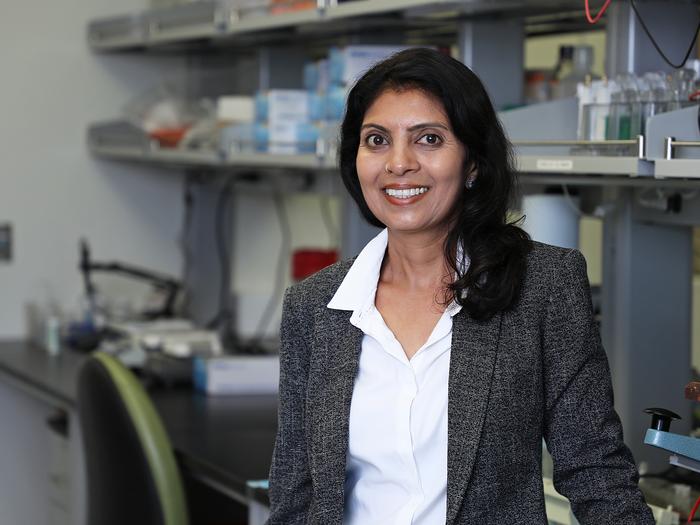Jyothi Nagajyothi, Ph.D. and her laboratory at the Hackensack Meridian Center for Discovery and Innovation (CDI) have identified what may be the main mechanism for how chronic Chagas Disease, a parasitic infection affecting millions of people worldwide, can cause irreversible and potentially fatal heart damage.

Credit: Hackensack Meridian Health
Jyothi Nagajyothi, Ph.D. and her laboratory at the Hackensack Meridian Center for Discovery and Innovation (CDI) have identified what may be the main mechanism for how chronic Chagas Disease, a parasitic infection affecting millions of people worldwide, can cause irreversible and potentially fatal heart damage.
The culprit is in the adipose (fat tissue) which the parasite Trypanosoma cruzi destroys in the course of infection, releasing smaller particles which induce the dysfunction of heart tissue, conclude the scientists in the journal iScience, a Cell Press open-access journal.
“We are attempting to understand this disease progression from asymptomatic to symptomatic cardiac conditions, so we can better stop the damage before it is done,” said Jyothi Nagajyothi, Ph.D., director member of the CDI.
Chagas is a disease caused by the parasite T. cruzi, transmitted mostly by insect bites. It afflicts 8 million people in Latin America and 400,000 in the rest of the world. Left untreated, it can cause heart failure years after initial infection.
Nagajyothi and her lab focus their research on how fat-storing cells, known as adipocytes, regulate the pathogenesis, progression and severity of infectious diseases including COVID-19 and Chagas, as well as cancers.
The laboratory has shown a significant correlation between body fat, and the phenomenon of ventricular dilation in the heart in experimental Chagas models. In a previous work, the scientists showed that T. cruzi causes oxidative stress and cell death in adipose tissue.
The latest study utilized both in-vitro and in-vivo models to delineate the molecular pathway triggered by infection-induced adipocyte apoptosis (cell death) and the subsequent response elicited by the released extracellular vesicles known as adipomes.
Their findings, which involved isolating intact adipomes from the adipose tissue microenvironment and plasma, and assessing them via transmission electron microscopy, revealed a significant presence of large adipomes (L-adipomes) in adipose tissue during infection.
By gauging the effect of plasma-derived infection-associated L-adipomes (P-ILA), the scientists found that it regulates immunometabolic signaling amid Chagas infection – and thus induces cardomyopathy.
“These findings highlight adipomes’ pivotal role in promoting inflammation and impairing myocardial function during cardiac remodeling in Chagas disease,” the authors write. “Furthermore, their research identifies that the composition of adipomes is tailored to the physiological state of adipose tissue. Hence, plasma adipomes can serve as specific biomarkers for disease progression identification.”
Journal
iScience
DOI
10.1016/j.isci.2024.109672
Method of Research
Experimental study
Subject of Research
Animals
Article Title
Adipocyte-released adipomes in Chagas cardiomyopathy: Impact on cardiac metabolic and immune regulation
Article Publication Date
4-Apr-2024
COI Statement
The authors declare no competing interests.




